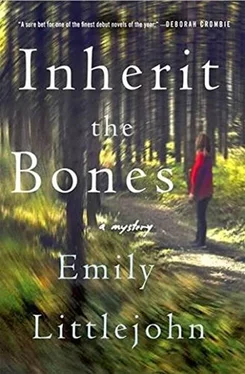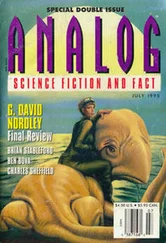“Whose idea was it to stop at the waterfall?”
She shook her head. “I don’t remember. Maybe it was Paul’s idea… Mr. Winters. Maybe it was Nick’s idea? We were hungry and it was a beautiful day.”
I nodded again. I remembered; it had been a beautiful day.
July 6, a Friday, with temps in the mid-eighties. Paul Winters operated the Forward Foundation; a local youth group whose mission was the empowerment of teens through physical action and decision-making situational activities. Think AmeriCorps meets Outward Bound.
Annika said, “We dropped our bags and set up blankets near the edge of the cliff, but not too close. We weren’t dumb. Paul handed out crackers and cheese and cookies and we ate and then kind of stretched out, you know, to enjoy the sun. Like cats.”
I knew the spot well. I hadn’t been part of the investigation; I’d picked up a stomach bug that week that knocked me on my ass and took ten pounds off my already slim figure, but I’d been up there since, plenty of times. About ten yards off the trail, at the halfway point up to Mount Wrigley, there is an unmarked path that leads to a viewing point for Bride’s Veil. The waterfall is eighty feet high and raging by the middle of summer, when the snowmelt is at its peak, and the Arkansas River rages through the Rockies.
There is a small meadow by the viewing point, and this had been where the eleven teenagers and Paul Winters stopped for a bite to eat. The ground is flat, but begins to erode the closer you get to the edge of the cliff. Nicky wasn’t the first to fall there; in fact, since the late 1800s, three other people had died, either by suicide or accident, at Bride’s Veil.
Annika continued. “At some point, I fell asleep. I’d been up all night, too cold to get much rest, and the lunch and sunshine were so nice that when I closed my eyes, I fell into a deep sleep. Do you know what I mean? The kind of oblivion where you wake and you can’t even figure out where you are?”
“Sure.”
Annika took a deep breath and stopped pacing and sat back down next to me on the bed. Her skin was unlined and her blue eyes like two crystals, and I felt a moment of sadness at the speed with which time sneaks over us all. My own face, less than a dozen years older, had an ever-increasing map of the worries that had crept my way, and the hours spent in the sunshine, and the laughs I’d had, and the tears.
“I woke up because someone was screaming. Then there was shouting, and more screaming. When I sat up, I saw everyone at the viewing point, looking down. Everyone was there except Nicky. And I knew.”
“You knew what?”
“I knew he was gone. Gemma, when we were born, we were holding hands. That’s how close we were.”
Annika laughed at my look of surprise and I was struck again by the musical tinkle her laugh held, like wind chimes dancing in a breeze. “My mom had a C-section. When the doctors pulled us out, Nicky and I were facing each other, holding hands. They took a photograph of us, it’s around here somewhere. I think we were even in some magazine.”
She leaned over the bed and started pulling picture albums out. “When we were little, I called Nicky my shadow. He always said he wasn’t my shadow but my mirror. When I was about to do something bad, Nicky would appear in front of me and reflect back the naughtiness, even if he wasn’t physically there. Does that make sense? He was like my ethics barometer. Weird, huh?”
The bedroom door opened a few inches and we both looked up, startled. Mrs. Watkins-Aunt Hannah-peeked her head in. “The others are finished downstairs, Detective.”
“Thanks, I’ll be down in a minute,” I told her, and stood. Annika rose, too, and to my surprise, gave me a hug. Her body felt thin but strong, like a whippet.
“Thanks for talking to me. It helps,” she said. She went to the corner and picked up the guitar.
“They never talk to me about the serious stuff. My parents, I mean. They think I’m weak, fragile. That I can’t handle it.”
She strummed the chords, her notes deliberate and melodic. “Did you take any languages in college, Gemma?”
I nodded. “French. I haven’t spoken a word of it in years.”
She continued strumming and I recognized the melody, one I was sure I’d be singing myself very shortly.
Rock-a-Bye, baby…
“I’m a philosophy major, so I have to take Greek. We’re on prefixes right now. Did you know that the Greek prefix A means without? As in, lacking?”
In the treetop…
I said, “That does ring a bell, yes.”
When the wind blows, the cradle will rock…
Annika strummed and hummed, and the rest of the words came to me, words that all of a sudden seemed menacing for a nursery song: Rock-a-bye, baby, in the treetop, when the wind blows, the cradle will rock, when the bough breaks, the cradle will fall, and down will go baby, cradle and all.
Down will go Nicky…
Annika stopped strumming and laid the guitar down. “My mother was a philosophy major. She’s fluent in ancient Greek, Latin… all the languages of the dead. I asked my dad the other day which of them named us, Nicky and me. He said it was my mom.”
“Nicholas and Annika,” I said. A chill crept down my back and I shivered.
I understood but I didn’t understand.
“Annika: without Nika, without Nick. I am without Nick. It’s like my mom knew that someday, he’d be gone, and so she cursed me with this stupid name so I’ll always remember. I’ll always be without Nick.”
I spent the afternoon at the station, writing up my report and reviewing the initial findings from the interviews conducted on some of the circus workers. The officers’ notes indicated many of the employees were reluctant to talk to the police; accordingly, there wasn’t much to go on: Reed Tolliver had been pleasant, hardworking. He didn’t have enemies. He had a girlfriend, and I made a note to interview her myself, along with Joe Fatone, the general manager.
At four, Finn Nowlin stopped by and dropped a sheet of paper on my desk. “Merry Christmas, Gemma.”
“What’s this? A list of cities, sweet! Are these locations of active restraining orders against you?”
Finn smirked. “You’re hilarious, you know that? It’s all the towns that Fellini’s Circus has been through in the last two years. You might want to put a call out to our colleagues and see what kind of murders they saw around the same time the circus was in town. Maybe we got a serial killer on our hands.”
He knew it was a great idea and he knew that I knew it, too. He also knew it hadn’t even crossed my mind.
“Thank you,” I managed. “Fatone didn’t say anything about any other murders.”
“I know, I read the report. There are two things that jump to mind. One, maybe Fatone is your guy. I’d be careful around him. Two, maybe your killer works for the circus and his other victims have all been, uh, townspeople, you know, going to the circus. Maybe killing his coworker is a first.”
Finn had some good points. He walked off and I started the tedious task of finding contacts for police departments in those cities. It took two hours and when I was finished, I had a list of more than a hundred phone numbers. I left it, with a cover sheet, on Sam’s desk. He could make the calls; cops are notoriously territorial and it would be good for Sam to get some practice at establishing diplomatic relations with our buddies in Kansas, Nebraska, Ohio.
Before I left the station, I made arrangements to meet with Fatone at the fairgrounds the next morning. That would give me an opportunity to review the crime scene, do a walk-around without the presence of the body and all the blood.
Читать дальше

![Лаура Бренз - Потомственная ведьма[Inherit the Witch]](/books/79609/laura-brenz-potomstvennaya-vedma-inherit-the-witch-thumb.webp)










